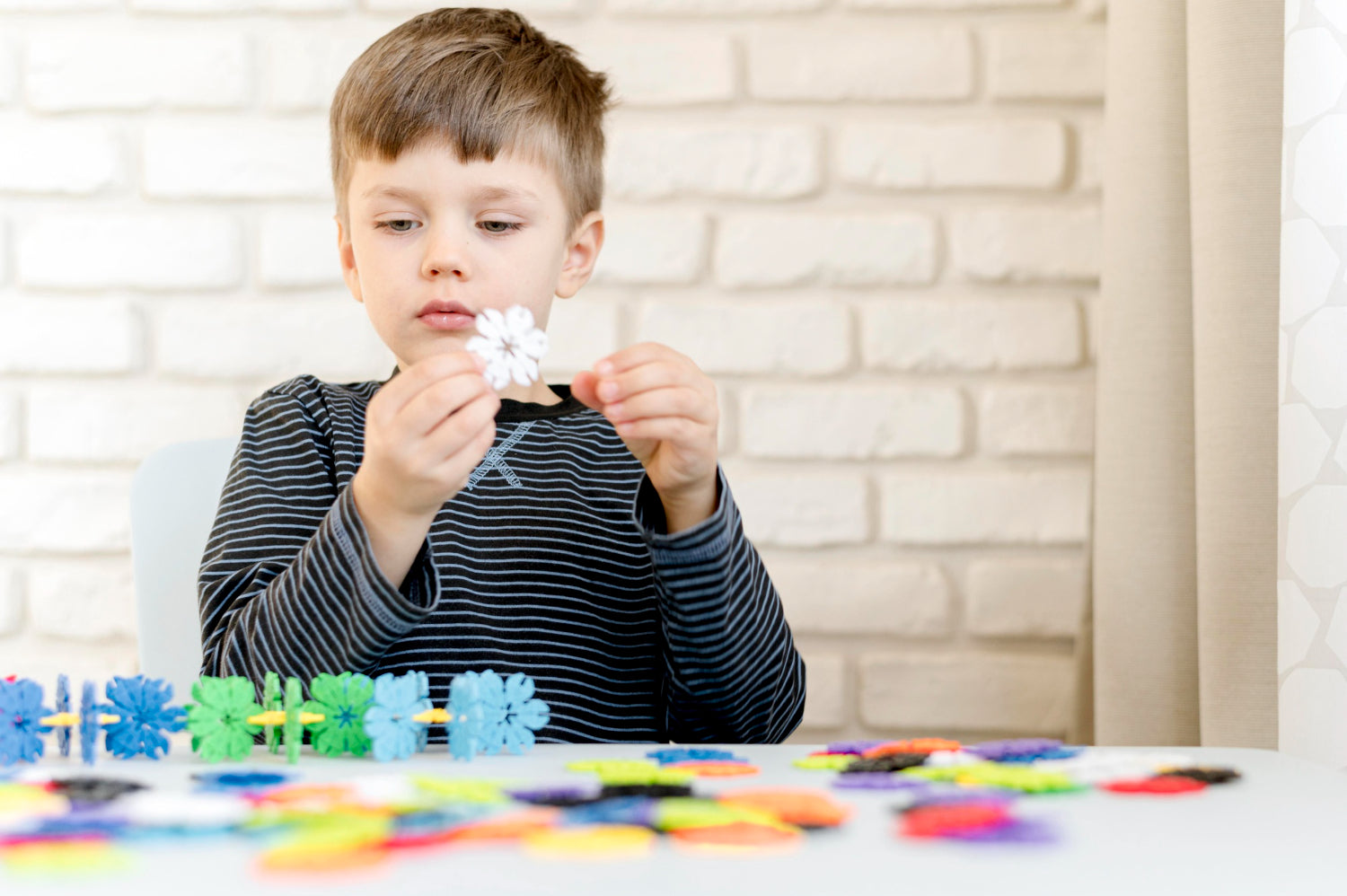TABLE OF CONTENTS
Written by Hillary Bennetts
December 19, 2024
What Not to Do With an Autistic Child

Navigating life with an autistic child is a journey filled with unique experiences and learning opportunities. As a parent or caregiver, you might sometimes feel like you’re in uncharted parenting territory, especially if your child’s behaviors and needs set them apart from their peers. It’s not unusual to feel isolated or misunderstood, particularly when your child’s behaviors make them stand out in ways that other family members or friends might not fully grasp.
For instance, imagine you’re at a family gathering, and your child becomes overwhelmed by the noise and commotion. They might withdraw, or have a meltdown, which can lead to awkward glances or comments from others. As a parent, you might feel like you’re dealing with these challenges alone, and that your child is missing out on social opportunities because of their unique needs. It’s a tough situation that can leave you feeling isolated.
But it’s important to remember that being autistic comes with a unique set of strengths and talents. Many autistic children have exceptional skills and abilities. They might have an incredible attention to detail, a deep passion for specific interests, or a remarkable capacity for creativity and problem-solving. These gifts are as much a part of their identity as any challenges they face.
In this guide, we’ll cover what not to do when supporting an autistic child, focusing on avoiding common pitfalls and embracing their unique qualities. Our aim is to provide you as parents with practical advice, help you understand and support your child’s needs, and highlight the many positive aspects of autism. We want to empower you with the knowledge and confidence to create a nurturing environment where your child’s strengths are celebrated and their challenges are met with compassion and understanding.
Understanding Autism: A Comprehensive Overview
“Autism Spectrum Disorder” (ASD) is a complex condition that affects individuals in various ways, and understanding it fully requires recognizing its diversity. Autism is not one-size-fits-all. It is a spectrum that reflects a wide range of behaviors, communication styles, and interests. It’s also part of the broader category of neurodivergent conditions, which includes other variations in neurological development. Read our informative blog post on how to explain autism to kids.
What is Autism?
According to the Diagnostic and Statistical Manual of Mental Disorders, Fifth Edition (DSM-5), autism is defined by differences in communication and social interactions, along with repetitive behaviors and restricted interests. These traits can show up in many different ways, which is why autism is described as a spectrum. Some individuals might have strong verbal communication skills but struggle with social interactions, while others might have difficulty with speech but excel in understanding visual information.
Real-Life Examples
To better understand how autism can vary and the kinds of strengths it can bring, let’s look at a few notable examples. Dan Aykroyd, the acclaimed actor and comedian, has spoken openly about how his autism has influenced his work in entertainment, contributing to his unique approach to his craft. Elon Musk, known for his groundbreaking work in technology and space exploration, has also shared how his neurodivergent perspective has shaped his innovative thinking.
These examples illustrate that autism, as a form of neurodivergence, is not just a list of challenges but also a source of exceptional talents and insights. It’s a reminder that autistic individuals can, and do, achieve remarkable things.
Joe Carr’s Perspective
Joe Carr, the cofounder of Serenity Kids, is a prime example of how being autistic can shape one’s path in unique and positive ways. After discovering he was autistic while in college, Carr has embraced his neurodivergent identity, viewing it not as a flaw but as a different way of experiencing and interacting with the world. He speaks openly about how his autism was essential to helping him rethink baby food, and create an unconventional and inclusive work environment. Carr’s perspective underscores that autism is a unique blend of strengths and challenges rather than a limitation. His experience highlights that understanding and celebrating these differences can lead to remarkable achievements and personal growth.
Embracing the Spectrum
In short, understanding autism means appreciating that each autistic individual has their own set of characteristics and strengths. It’s about recognizing the broad range of experiences and talents within the autism spectrum and providing support that is tailored to each person’s unique needs. This approach helps ensure that all autistic adults and children are not only supported in their challenges but also celebrated for their unique abilities and contributions.
Common Missteps to Avoid
Supporting an autistic child involves understanding their unique needs and feelings and adapting your approach accordingly. Here are some common missteps to avoid, along with practical, friendly advice on how to better support and engage with your child:
Don’t Assume Uniformity

Autism is a spectrum, and each child experiences the world differently. It’s crucial not to make assumptions about behavior based on generalizations about autism. Just because one child might have a particular gift or reaction to a situation doesn’t mean all autistic children will respond in the same way.
Imagine you have two children with autism. One might be highly sensitive to loud noises, becoming distressed in bustling environments. For this child, noise-canceling headphones could be a game-changer, helping them feel more comfortable in public spaces. On the other hand, another child might not be as sensitive to sound and might not need this type of accommodation. Understanding and addressing each child’s specific gifts and sensitivities key to providing effective support.
An autistic child who excels academically but struggles with social interactions might have minimal sensitivity to noise, but they might need extra support in understanding social cues. Tailoring support to their specific needs, such as providing access to advanced academic challenges along with social skills training or a mentor, can be very beneficial.
Don’t Ignore Their Unique Communication Style
Autistic children may use a variety of communication methods. Some might express themselves verbally, while others might use gestures, picture boards, or communication devices. It's important not to dismiss or undervalue their preferred communication methods. Instead, support their style and work to find effective ways to interact with them.
Suppose you have a child who uses picture cards to communicate their needs. Rather than insisting they speak verbally, you can integrate these picture cards into their daily routines, and provide easy access to a variety of art supplies. This can help them express themselves more easily and reduce frustration. Supporting their preferred method of communication can make interactions smoother and more effective.
Another autistic child might use advanced language skills but struggle with pragmatic aspects of communication, like understanding idioms or sarcasm. For these children, engaging in discussions about complex issues, while incorporating clear and direct language into your interactions can help them navigate social situations more comfortably.
Don’t Force Eye Contact or Physical Interaction

Eye contact and physical touch can be overwhelming for many autistic children. Forcing them to conform to typical social norms can lead to increased anxiety and discomfort. Respecting their boundaries and finding alternative ways to connect is essential.
If a child is uncomfortable with eye contact, consider engaging them through activities they enjoy, like drawing or playing with toys. This approach allows you to connect with them in a way that feels more natural and comfortable for them. It's about finding ways to build a connection that respects their personal space and preferences.
An autistic child may prefer minimal physical touch but still enjoy close interactions through shared activities like building models or playing video games. Recognizing their comfort zones and engaging in activities they enjoy can foster positive interactions without pressuring them into uncomfortable situations.
Don’t Underestimate Their Interests
Autistic children often have intense and specific interests. These passions can be a powerful tool for learning, engagement, and eventually successful careers. Avoid downplaying these interests and instead use them to motivate, enrich and connect with your child.
Think about a child who is really into trains. Instead of seeing this interest as a distraction, use it to boost their learning. For example, you could incorporate train-related themes into math problems, reading activities, or even science projects. By aligning educational activities with their interests, you can make learning more engaging and enjoyable for your child.
An autistic child with a deep interest in computers might excel in technology-related subjects. Leveraging their interest, you could encourage or teach them to participate in coding clubs or tech camps. This can not only enrich their learning experience but also build skills that can be valuable in their future.
Don’t Focus Solely on the Challenges
It’s important to address the challenges autistic children face, but it’s equally important not to let these challenges overshadow their strengths. Celebrate their achievements and provide opportunities for them to showcase their talents.
For example, if a child excels in art or a particular subject at school, celebrate these accomplishments. Highlighting their successes, whether it’s mastering a new skill or excelling in a hobby, can help build their self-esteem and encourage them to continue growing. Recognizing and celebrating their strengths fosters a positive self-image and supports their overall development.
An autistic child might be exceptionally talented in music or mathematics. Acknowledging their talents and providing opportunities to perform, participate in competitions, or further develop their skills can be incredibly encouraging. Celebrating their successes not only boosts their confidence but also helps them see their unique abilities as assets.
By avoiding these common missteps and focusing on understanding and celebrating your child’s unique needs and abilities, you can create a more supportive and enriching environment for them. Recognizing their individuality and strengths ensures that they have the best chance to thrive and grow.
Talk About Autism
While mitigating challenges and celebrating gifts, it can be helpful to acknowledge the role autism might be playing. This can help de-stigmatize autism, and help your child understand how to fully integrate their autistic identity, and avoid a feeling of brokenness.
For instance, when struggling with social interaction, you could say, “I know this is harder for you than other kids, your autism makes it more challenging”. Or, “Wow you spent a long time on that art piece! You know, your autism helps you stay focused for long periods like that and be extra creative”.
Regularly naming autism’s impact on both challenges and gifts can help them accept the balance of challenges and gifts their autism provides, while also modeling how they can explain to others how autism affects them.
Embracing Autism’s Unique Gifts
Autism is often described in terms of its challenges, but it’s equally important to recognize the unique strengths and gifts that many autistic individuals possess. Embracing autism as a neurological difference allows us to appreciate these attributes fully, and remind your child they are special, not broken. Or “different, not less” as Temple Grandin says.
1. Embrace Their Unique Perspective
Autistic individuals often have a unique way of viewing the world, leading to creative and innovative thinking. Encourage and nurture this perspective rather than trying to fit them into conventional molds.
For example, an autistic child’s unique problem-solving approach might lead to creative solutions that others may not consider. Celebrate these moments and encourage their innovative thinking.
2. Foster Independence and Self-Esteem
Support your child in developing independence and confidence. Provide opportunities for them to practice skills, make choices, and build self-reliance.
Allow your child to participate in age-appropriate tasks, such as choosing their clothes or helping with household chores. These activities promote a sense of accomplishment, discipline, and self-esteem.
3. Encourage and Support Their Talents
Help your child explore and develop their talents and interests. Whether it's a hobby, academic subject, or creative pursuit, supporting their passions can lead to personal growth and fulfillment.
If your child has a passion for art, for example, provide them with materials and opportunities to create. Enroll them in art classes or encourage them to showcase their work. Try not to worry that they aren’t doing a variety of activities. Our economy needs specialists more than generalists, so they’re actually more likely to be successful if they are incredibly good at one thing!
4. Provide a Structured and Predictable Environment
Many autistic children thrive in environments with clear routines and predictable structures. As much as possible, create a stable and organized space that helps reduce anxiety and supports their need for consistency.
Develop a daily schedule with visual cues and consistent routines. This approach helps create a sense of security and predictability for your child.
Exploring Support Options
There are many ways to provide effective support and enhance your child’s strengths. Finding the right approach often involves working with professionals who understand autism, celebrate its unique qualities, and can connect with your child effectively.
Behavioral Therapy:
Behavioral therapies are designed to help with various skills and behaviors, including communication, social interactions, and managing challenging behaviors. The key is to customize the therapy to fit your child’s individual needs. For instance, if your child has difficulty with social cues, behavioral therapy can include role-playing and social skills training to improve their interactions with others. Just make sure any therapist is committed to celebrating their gifts as well as challenges, and never implies their natural state is somehow bad or wrong. The spirit of therapy must be to help them build skills to participate in a non-autistic world, not to “change” or “fix” their natural way of being.
Speech and Language Therapy:
This type of therapy focuses on improving communication abilities and addressing any speech delays. A good speech therapist will use techniques that align with your child’s preferred communication style, whether they’re verbal, use gestures, or rely on communication devices. For example, if your child uses picture cards, a speech therapist might incorporate these into sessions to support their speech development.
Occupational Therapy:
Occupational therapy helps children develop essential daily living skills and manage sensory processing challenges. This might involve activities to improve fine motor skills, such as buttoning shirts or using utensils, and strategies to help with sensory sensitivities. For example, if your child is sensitive to certain textures or sounds, an occupational therapist can work on desensitization techniques and create a more comfortable environment for them.
Additional Support Options:
-
Educational Support: Work with your child’s school to create an Individualized Education Program (IEP) or 504 Plan that addresses their specific needs. This might include tailored classroom accommodations or specialized instruction.
-
Social Skills Groups: These groups can provide a supportive environment where children can practice social interactions and build friendships with peers who understand their experiences.
-
Family Support and Counseling: Family counseling can be beneficial for everyone in the family, helping you navigate the challenges of raising a child with autism and providing strategies for effective communication and support. And at the very least help you all remember you’re not alone!
By exploring these options and collaborating with professionals who understand your child’s unique needs, you can create a supportive framework that helps them thrive. Remember, the goal is to enhance their strengths and provide them with the tools they need to succeed in their own way.
Advocacy and Inclusion: A Call to Action
Advocacy is essential in creating a world where autistic individuals feel seen, supported, and included. Families can make a significant impact by engaging in community efforts and championing policies that promote acceptance and equal opportunities for autistic kids.
Community Involvement: There are many ways to get involved locally. Look for advocacy groups or organizations that focus on autism awareness and inclusion. Participating in community events, joining local support groups, or volunteering with organizations dedicated to autism can help raise awareness and drive positive change. These activities not only support the autism community but also build a network of support for families navigating the challenges of autism.
Policy Advocacy: Advocating for fair policies is another powerful way to make a difference. Support policies that promote inclusive practices in schools and workplaces. This might involve speaking to the school board or local legislators, participating in campaigns for better accommodations, or supporting initiatives that aim to improve accessibility in public spaces. By encouraging and supporting inclusive legislation, you help create environments where autistic individuals can thrive.
Additional Resources for Families: Having access to resources can provide families with valuable support and information. Here are some recommended books, websites, and organizations that offer further insights and guidance:
Books:
-
"The Reason I Jump: The Inner Voice of a Thirteen-Year-Old Boy with Autism" by Naoki Higashida - This book provides a unique perspective on autism through the eyes of a non-verbal autistic teenager. Written by Higashida, who was diagnosed with autism at a young age, it offers valuable insights into his thoughts and experiences. The book has been praised for its honest and personal portrayal of autism and is often recommended for its ability to provide a deeper understanding of what it's like to live with autism.
-
"NeuroTribes: The Legacy of Autism and the Future of Neurodiversity" by Steve Silberman - This book is a comprehensive exploration of the history of autism and the concept of neurodiversity. Silberman explores the historical context of autism, its diagnosis, and the movement toward understanding and accepting neurodiversity. It has received acclaim for its thorough research and thoughtful analysis, and it's considered a significant contribution to the discussion about autism and neurodiversity.
-
"The Autistic Brain: Helping Different Kinds of Minds Succeed" by Temple Grandin and Richard Panek - Written by Temple Grandin, a well-known advocate and autistic individual, this book explores the neurological basis of autism and offers insights into how autistic individuals perceive and interact with the world. It provides practical advice for leveraging the strengths of autism while addressing common challenges.
Websites:
Organizations:
-
National Autistic Society
-
Autism Research Institute
Conclusion
Autism is best understood as a neurological developmental difference rather than a disability. By embracing autism as a unique way of being, we can shift our focus to the strengths and extraordinary gifts that individuals with autism contribute to our world.
Joe Carr’s experience exemplifies the importance of celebrating autism and appreciating its inherent value. “We aren’t disabled, we are different,” Carr underscores, reminding us that our perspective plays a crucial role in shaping how we interact with and support autistic individuals. By viewing autism through this lens, we can create a more inclusive and respectful environment that recognizes and values every individual's unique contributions.
It’s important to remember that each autistic child has their own special traits and talents. Whether it’s a keen eye for detail, a unique way of thinking, or an intense passion for certain interests, these qualities can be powerful assets. By focusing on and nurturing these strengths, we not only help children thrive but also foster a greater appreciation for their individuality.
As we support our children, let’s celebrate the diversity of experiences and perspectives they bring into our lives. Respect their boundaries, encourage their growth, and actively seek ways to make their environments more inclusive. By doing so, we can help each child feel valued and understood, making a positive impact on their development and well-being.
Together, let’s build a world where every child, regardless of where they fall on the autism spectrum, feels supported and empowered. By recognizing their gifts and respecting their unique needs, we pave the way for a more inclusive and compassionate society. So, let’s commit to making this journey one of celebration and support, ensuring that every child has the opportunity to shine.
You Might Also Like
· 1 min read · Recipes
· 7 min read · Education














































